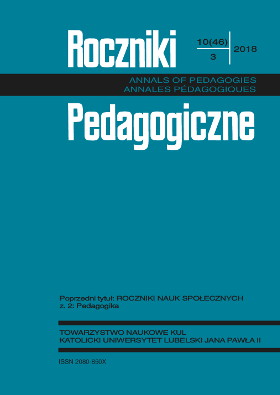Związek poziomu rozwoju zabawy w udawanie z nasileniem symptomów autyzmu u dzieci z ASD w wieku przedszkolnym i młodszym szkolnym
The Relationship Between the Level of Development of Pretend Play and Severity of ASD Symptoms in Pre-School and Younger School Aged Children
Author(s): Karolina Krzysztofik, Katarzyna MariańczykSubject(s): Social Sciences, Psychology, Developmental Psychology, Clinical psychology
Published by: Towarzystwo Naukowe KUL & Katolicki Uniwersytet Lubelski Jana Pawła II
Keywords: autism spectrum disorder; pretend play
Summary/Abstract: Pretending in play is the foundation for the further development of a young child, and the deficit in the development of this skill results in his difficulties in making peer relationships. Such a difficulty is a key characteristic of the functioning of children with autism spectrum disorders (ASD). Researchers also notice a significantly reduced level of development of the ability to pretend in play and its relationship with the severity of autism symptoms. However, there is a lack of precise description in the literature of which autism symptoms this relationship applies to.In order to establish the relationships between: the level of development of the ability to pretend play and the autism syndrome severity, there was conducted studies in a group of 38 children with ASD, between 4.0 and 9.3 years of age. The following tools were used: Autism Syndrome Severity Scale (Krzysztofik, Otrębski, 2016) and the Pretend play – third part of SToMM (Krzysztofik, 2016). Obtained results indicating the existence of relationships between the level of development of the ability to pretend play and the severity of autism syndrome (especially deficits in social interactions and communication), have some implications for the rehabilitation of people with ASD.
Journal: Roczniki Pedagogiczne
- Issue Year: 10/2018
- Issue No: 3
- Page Range: 141-151
- Page Count: 11
- Language: Polish

